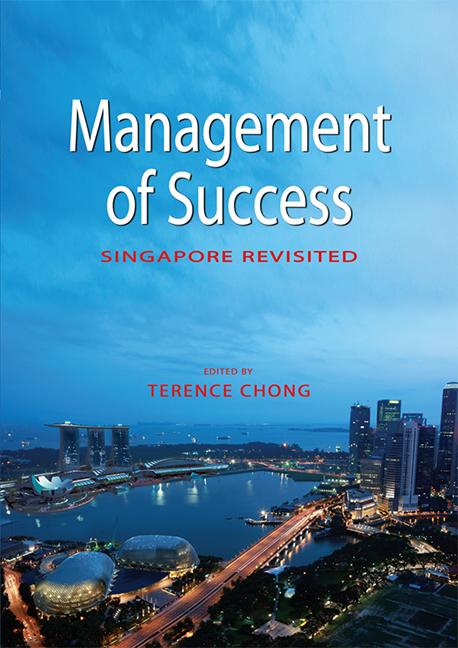Book contents
- Frontmatter
- Contents
- List of Tables and Figures
- Foreword
- Message
- Quote
- Preface
- The Contributors
- 1 Introduction: The Role of Success in Singapore's National Identity
- SECTION 1 SINGAPORE IN THE BIGGER PICTURE
- SECTION 2 LEADERSHIP, POLICY AND POLITICS
- SECTION 3 THE RESTRUCTURING OF THE ECONOMY
- SECTION 4 THE TRANSFORMATION OF SOCIETY
- SECTION 5 THE LAW
- SECTION 6 MODIFICATION OF THE ENVIRONMENT
- SECTION 7 COMMUNITY AND NATIONAL SECURITY
- SECTION 8 LIFE IN SINGAPORE
- 26 Culture, the Arts and the Global City
- 27 Fluid Nation: The Perpetual “Renovation” of Nation and National Identities in Singapore
- 28 Suffer the Rebellious Children: The Politics of Remaking Singapore and the Remaking of Singapore Politics
- 29 “It's Like Rice on the Table, It's Our Common Dish”: The English Language and Identity in Singapore
- 30 Multiculturalism and the Problem of Solidarity
- 31 Sexual Governance and the Politics of Sex in Singapore
- 32 Conclusion
- Index
28 - Suffer the Rebellious Children: The Politics of Remaking Singapore and the Remaking of Singapore Politics
from SECTION 8 - LIFE IN SINGAPORE
Published online by Cambridge University Press: 21 October 2015
- Frontmatter
- Contents
- List of Tables and Figures
- Foreword
- Message
- Quote
- Preface
- The Contributors
- 1 Introduction: The Role of Success in Singapore's National Identity
- SECTION 1 SINGAPORE IN THE BIGGER PICTURE
- SECTION 2 LEADERSHIP, POLICY AND POLITICS
- SECTION 3 THE RESTRUCTURING OF THE ECONOMY
- SECTION 4 THE TRANSFORMATION OF SOCIETY
- SECTION 5 THE LAW
- SECTION 6 MODIFICATION OF THE ENVIRONMENT
- SECTION 7 COMMUNITY AND NATIONAL SECURITY
- SECTION 8 LIFE IN SINGAPORE
- 26 Culture, the Arts and the Global City
- 27 Fluid Nation: The Perpetual “Renovation” of Nation and National Identities in Singapore
- 28 Suffer the Rebellious Children: The Politics of Remaking Singapore and the Remaking of Singapore Politics
- 29 “It's Like Rice on the Table, It's Our Common Dish”: The English Language and Identity in Singapore
- 30 Multiculturalism and the Problem of Solidarity
- 31 Sexual Governance and the Politics of Sex in Singapore
- 32 Conclusion
- Index
Summary
POLITICS OF REMAKING SINGAPORE
When analyzing the Singapore socialpolitical-cultural landscape of their times, contributors to the 1989 volume of Management of Success intimated at “clearly audible murmurs of discontent” and how “de-politicization of the recent past has been replaced by a re-politicization of the citizenry”. Acknowledging the People's Action Party (PAP) government's awareness of these challenges, the book told its readers to expect a policy mix of containment and compromise to deal with a more contentious citizenry. Through much of the 1990s, concerned that growing individualism could spawn a Western-inspired rights-based polity (something the PAP leadership wanted to avoid), official programmes promoted moral education a such as self-discipline, diligence, deference to authority, a readiness to sacrifice self-interest for the greater good of the community, and these were supposed to provide “cultural ballast” against “insidious elements of decadent Western culture”. To be sure, the PAP response also involved a new vision of a liberalized Singapore but the extent of any liberalization policy would be marked by a definition of political stability that must include itself at the helm. Nobody doubted that in the foreseeable future, the authoritarian grip of the PAP would be intact and the editors of the 1989 volume concluded with a cautionary remark that the public demand had not been made for the PAP to relinquish power which will be the true test of democracy. Reflecting the cautiousness, the index in that 1989 book did not have terms such as “civil disobedience”, “dissent”, or their approximation. No analyst then saw a possibility of that kind of restiveness on the horizon. Twenty years down the line, in this successor volume, that lacuna has to be plugged, not least because the starting point of this article is the return of civil disobedience after decades of its near total absence. Examples of such behaviour have picked up momentum in the last three years that the phenomenon cannot pass unnoticed.
If the contributors to the 1989 Management of Success volume did not envisage the kind of restiveness that twenty years would bring with a younger generation of citizens, it is partly because they did not foresee the details of a significant PAP project to remake Singapore.
- Type
- Chapter
- Information
- Management of SuccessSingapore Revisited, pp. 521 - 535Publisher: ISEAS–Yusof Ishak InstitutePrint publication year: 2010



